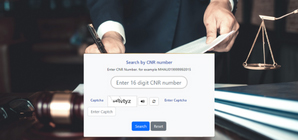 Personal Loan ESC bounce
Personal Loan ESC bounce
5 months ago
I have 3 PL from CRED app lending partner IDFC, (who will take legal action & 3 case or 1 case) i missed 2 EMI and i don't have money to pay, what the bank will take legal action, if they file ECS bounce case, do i need to travel to other location if they file case in different location, what is the fees and court expenses for this. Please help me.
A.Dear Sir,
In many cases ECS bounce cases are being filed to give trouble to borrowers. You may approach High Court and get a stay.
In many cases ECS bounce cases are being filed to give trouble to borrowers. You may approach High Court and get a stay.
Helpful
Helpful
Share
A.Dear Sir,
In many cases ECS bounce cases are being filed to give trouble to borrowers. You may approach High Court and get a stay.
In many cases ECS bounce cases are being filed to give trouble to borrowers. You may approach High Court and get a stay.
Helpful
Helpful
Share
A.Dear Client
The jurisdiction where the case is filed typically depends on the terms of your loan agreement. It's common for cases to be filed in the jurisdiction where you reside or where the loan was sanctioned. In some cases, agreements may specify a particular jurisdiction. Whether you need to travel to a different location depends on the legal proceedings and the policies of the jurisdiction involved. In many cases, you may be able to hire a local attorney to represent you, reducing the need for personal appearances.
The jurisdiction where the case is filed typically depends on the terms of your loan agreement. It's common for cases to be filed in the jurisdiction where you reside or where the loan was sanctioned. In some cases, agreements may specify a particular jurisdiction. Whether you need to travel to a different location depends on the legal proceedings and the policies of the jurisdiction involved. In many cases, you may be able to hire a local attorney to represent you, reducing the need for personal appearances.
Helpful
Helpful
Share
A.Dear Client,
Once a loan is not repaid by the borrower for any reason whatsoever, it is treated by the Bank as NPA. Accordingly, the Bank sends notice to the Borrower asking him/her for repayment of the entire dues lying against your loan offering suitable terms. In the absence of any response from the Borrower, the Bank starts the routine process of action prescribed under relevant laws for recovery of debt lying outstanding against the Borrower and, Guarantor who is equally liable for repayment of debt of principal Borrower and if after exercising all the steps for recovery of debt against the Borrower fails, the Bank takes steps for recovery of debts from the Guarantor attaching the security offered by guarantor against the loan. Being Guarantor you can make a prayer to the Bank for some more time to settle the dues but cannot escape yourself from your liability of repayment of your loans for any reason whatsoever. Moreover, legal actions may also be taken against you including filing a civil suit in court or initiating criminal proceedings against you. The banks may also make use of debt recovery tribunals in order to recover the dues they are owed from the defaulter borrower. Usually, Lenders are not legally obliged to settle a debt lowering the outstanding lying against debt, but because they want to protect their bottom line, they may agree to a debt settlement to avoid further financial loss. You can try to negotiate a debt settlement on your own, but sometimes it's typically done through third parties like debt relief companies, which you may hire to negotiate the settlement matter with the lender on your behalf. With this method, you will make payments to the debt settlement company rather than the lender Bank, along with chargeable fees. Debt settlement is an agreement between a lender and a borrower/Guarantor in which the borrower/Guarantor repays a portion of a loan balance and the lender forgives the balance. You may consider starting the negotiation by offering to pay 25% or 30% of your outstanding balance in return for forgiveness on the rest. But, it may be noted that while there are legitimate debt relief/settlement companies, there are also many scam operations of fake entities. So, if you're considering for settlement of dues, the Consumer Financial Protection Bureau(CFPB) suggests contacting your state attorney general's(AG) office and local consumer protection agency to ask if they have any consumer complaints on file about that company.. Further, a quick counselling session with a certified credit counsellor can help you to discover your options and choose the right path ahead.
Once a loan is not repaid by the borrower for any reason whatsoever, it is treated by the Bank as NPA. Accordingly, the Bank sends notice to the Borrower asking him/her for repayment of the entire dues lying against your loan offering suitable terms. In the absence of any response from the Borrower, the Bank starts the routine process of action prescribed under relevant laws for recovery of debt lying outstanding against the Borrower and, Guarantor who is equally liable for repayment of debt of principal Borrower and if after exercising all the steps for recovery of debt against the Borrower fails, the Bank takes steps for recovery of debts from the Guarantor attaching the security offered by guarantor against the loan. Being Guarantor you can make a prayer to the Bank for some more time to settle the dues but cannot escape yourself from your liability of repayment of your loans for any reason whatsoever. Moreover, legal actions may also be taken against you including filing a civil suit in court or initiating criminal proceedings against you. The banks may also make use of debt recovery tribunals in order to recover the dues they are owed from the defaulter borrower. Usually, Lenders are not legally obliged to settle a debt lowering the outstanding lying against debt, but because they want to protect their bottom line, they may agree to a debt settlement to avoid further financial loss. You can try to negotiate a debt settlement on your own, but sometimes it's typically done through third parties like debt relief companies, which you may hire to negotiate the settlement matter with the lender on your behalf. With this method, you will make payments to the debt settlement company rather than the lender Bank, along with chargeable fees. Debt settlement is an agreement between a lender and a borrower/Guarantor in which the borrower/Guarantor repays a portion of a loan balance and the lender forgives the balance. You may consider starting the negotiation by offering to pay 25% or 30% of your outstanding balance in return for forgiveness on the rest. But, it may be noted that while there are legitimate debt relief/settlement companies, there are also many scam operations of fake entities. So, if you're considering for settlement of dues, the Consumer Financial Protection Bureau(CFPB) suggests contacting your state attorney general's(AG) office and local consumer protection agency to ask if they have any consumer complaints on file about that company.. Further, a quick counselling session with a certified credit counsellor can help you to discover your options and choose the right path ahead.
Helpful
Helpful
Share
Read Related Answers
Dear Client,
To address a false complaint or false criminal proceedings filed against you, you can seek its quashing through a petition before the High Court under Section 482 of the Code of Criminal...
Dear Client,
Generally, FD can considered as a legitimate form of security for bail in cheque bounce case. However, in most of the cases it involves specific procedural requisites, wherein, the bank c...
Dear Sir,
You just file cheque bounce case against him and then let him contest the case and prove his defence which is very hard.
Dear Client,
According to Section 138 of Negotiable Instruments Act, cheque bounce is a punishable offence with an imprisonment of up to two years and fine up to twice the amount of cheque. So, the ag...
Dear Client,
a cheque bounce case under sec 138 of the NI act must be filed within 1 month of the act and legal notice must be sent within 45 days of the offence, but if the arrest is made 5 years af...
Read Blogs on Cheque Bounce
Cheque Bounce Lawyers

Find Lawyers by Location



























